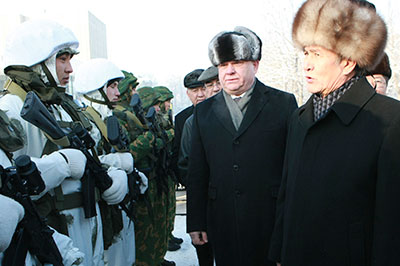Campaigners from local rights activists to U.N. High Commissioner for Human Rights Navi Pillay are urging Kyrgyz authorities to review the case of Azimjon Askarov, an investigative reporter and human rights activist serving a life sentence in Kyrgyzstan.
Askarov was handed the hefty sentence in September 2010 after being convicted on a set of fabricated charges, including complicity in a local police officer’s murder during the June 2010 ethnic conflict, CPJ research shows.
The U.N.’s Pillay visited Kyrgyzstan this week, and told a press conference in the capital Bishkek that she raised the subject of Askarov’s sentence during her meetings with President Almazbek Atambayev and Aida Salyanova, Kyrgyzstan’s top prosecutor. Pillay said she was concerned by how the case was conducted, and called on authorities to guarantee Askarov’s rights to a fair trial. “The performance of prosecutors and the judiciary need special attention,” Pillay said.
Her statement is in line with recommendations in CPJ’s recent report on Askarov’s case and our letter to Atambayev, where we outlined numerous procedural violations, including Askarov’s torture in custody, attacks against his lawyer, unsubstantiated charges, and neglect of exculpatory evidence. CPJ urged Atambayev and his government to review our findings; we are still waiting for the president’s response.
News reports suggest that authorities are resisting the calls to review Askarov’s case. Yevgeniya Krapivina, Askarov’s lawyer, told the independent regional news website Ferghana News Wednesday that regional prosecutors in Jalal-Abad, southern Kyrgyzstan, refused to reopen the investigation. The lawyer filed a request in late May with the general prosecutor–who forwarded it to Jalal-Abad–after defense witnesses, who had been intimidated into silence during Askarov’s trial in 2010, agreed to give their statements to authorities. In those statements, collected by the defense lawyers and made available to CPJ, Askarov’s neighbors said they saw him at home at the time the police office was murdered, and gave evidence contradicting the other charges.
“We wrote to the general prosecutor’s office, and will wait for an official response from the attorney general,” Krapivina told Ferghana News. In the meantime, Salyanova’s agency should consider Pillay’s suggestion to carefully evaluate local prosecutors’ work. Conflict of interest is the obvious reason.
It’s clear why Jalal-Abad prosecutors refuse to reopen Askarov’s case: they came up with the illogical and unsubstantiated charges against him in the first place; ignored his torture in custody; and sent him to jail in retaliation for his exposés of their abuses. Both Askarov and his other lawyer, Nurbek Toktakunov, told CPJ that regional prosecutors had long sought revenge on him. “I always obstructed their corrupt work. … They hated me,” Askarov told CPJ.
When appealing Askarov’s verdict before Kyrgyzstan’s Supreme Court in December, Toktakunov pointed out that the legal requirement to investigate and prosecute an alleged crime in the region where it took place resulted in intimidation of defense witnesses by the relatives and colleagues of the murdered police officer and an unfair trial. The lawyer said he had requested that the case be heard in another region, to no avail.
If the general prosecutor wants to bring justice to Askarov’s case, Salyanova must acknowledge the conflict of interest and assign an independent group of investigators from other regions to review it, instead of ordering Jalal-Abad prosecutors to re-investigate. This would be in line with both Kyrgyzstan’s commitment to rule of law and Atambayev’s stated intent to fight corruption.
